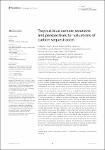Tropical blue carbon: solutions and perspectives for valuations of carbon sequestration
| dc.contributor.author | Hilmi, N | |
| dc.contributor.author | Benitez Carranco, MB | |
| dc.contributor.author | Broussard, D | |
| dc.contributor.author | Mathew, M | |
| dc.contributor.author | Djoundourian, S | |
| dc.contributor.author | Cassotta, S | |
| dc.contributor.author | Safa, A | |
| dc.contributor.author | Maliki, S | |
| dc.contributor.author | Descroix-Comanducci, F | |
| dc.contributor.author | Allemand, D | |
| dc.contributor.author | Berthomieu, C | |
| dc.contributor.author | Hall-Spencer, JM | |
| dc.contributor.author | Ferrier-Pagès, C | |
| dc.date.accessioned | 2023-08-24T15:09:33Z | |
| dc.date.available | 2023-08-24T15:09:33Z | |
| dc.date.issued | 2023 | |
| dc.identifier.issn | 2624-9553 | |
| dc.identifier.issn | 2624-9553 | |
| dc.identifier.other | ARTN 1169663 | |
| dc.identifier.uri | https://pearl.plymouth.ac.uk/handle/10026.1/21262 | |
| dc.description.abstract |
Tropical marine ecosystems provide a wide range of provisioning, regulating, supporting and cultural services to millions of people. They also largely contribute to blue carbon sequestration. Mangroves, seaweeds, and seagrass habitats are important because they store large amounts of organic carbon while fish play a fundamental role in the carbon transport to deep waters. Protecting and restoring tropical marine ecosystems is of great value to society because their decline impairs the vital services they provide, such as coastal protection and seafood supplies. In this marine policy paper, we present options for enhancing blue carbon sequestration in tropical coastal areas. In addition, we outline the economic value of four components of coastal ecosystems (mangroves, seagrass beds, seaweed forests and fish) and discuss the economic levers society can apply to ensure the end of the current gross mismanagement of tropical blue carbon ecosystems. Market-based solutions, such as carbon taxes or fines for violations that use the ‘polluter pays' principle, can be very effective in achieving national or international climate agreements. Private investment can also finance the preservation of blue carbon ecosystems. One widely known financing method for blue carbon conservation, particularly of mangroves, is the use of municipal bonds, which can be issued like traditional bonds to finance the day-to-day obligations of cities, states and counties. Non-philanthropic investments can also be used in order to protect these ecosystems, such as debt-for-nature swaps and the improved application of regulatory frameworks. Overall, the protection of tropical marine ecosystems is an ecological imperative and should also be seen as an opportunity for new revenue streams and debt reduction for countries worldwide. | |
| dc.format.extent | 1169663- | |
| dc.publisher | Frontiers Media SA | |
| dc.subject | tropical blue carbon | |
| dc.subject | ecosystem services | |
| dc.subject | conservation | |
| dc.subject | restoration | |
| dc.subject | market-based solutions | |
| dc.title | Tropical blue carbon: solutions and perspectives for valuations of carbon sequestration | |
| dc.type | journal-article | |
| dc.type | Review | |
| plymouth.volume | 5 | |
| plymouth.publication-status | Published online | |
| plymouth.journal | Frontiers in Climate | |
| dc.identifier.doi | 10.3389/fclim.2023.1169663 | |
| plymouth.organisational-group | |Plymouth | |
| plymouth.organisational-group | |Plymouth|Research Groups | |
| plymouth.organisational-group | |Plymouth|PRIMaRE Publications | |
| plymouth.organisational-group | |Plymouth|Faculty of Science and Engineering | |
| plymouth.organisational-group | |Plymouth|Faculty of Science and Engineering|School of Biological and Marine Sciences | |
| plymouth.organisational-group | |Plymouth|Research Groups|Marine Institute | |
| plymouth.organisational-group | |Plymouth|REF 2021 Researchers by UoA | |
| plymouth.organisational-group | |Plymouth|Users by role | |
| plymouth.organisational-group | |Plymouth|Users by role|Academics | |
| plymouth.organisational-group | |Plymouth|REF 2021 Researchers by UoA|UoA07 Earth Systems and Environmental Sciences | |
| dcterms.dateAccepted | 2023-05-30 | |
| dc.date.updated | 2023-08-24T15:09:33Z | |
| dc.rights.embargodate | 2023-8-26 | |
| dc.identifier.eissn | 2624-9553 | |
| dc.rights.embargoperiod | forever | |
| rioxxterms.versionofrecord | 10.3389/fclim.2023.1169663 |


